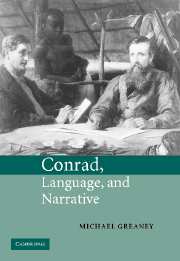Book contents
- Frontmatter
- Contents
- Acknowledgements
- Introduction
- PART I SPEECH COMMUNITIES
- 1 ‘The realm of living speech’: Conrad and oral community
- 2 ‘Murder by language’: ‘Falk’ and Victory
- 3 ‘Drawing-room voices’: language and space in The Arrow of Gold
- PART II MARLOW
- PART III POLITICAL COMMUNITIES
- Conclusion
- Notes
- Bibliography
- Index
2 - ‘Murder by language’: ‘Falk’ and Victory
Published online by Cambridge University Press: 22 September 2009
- Frontmatter
- Contents
- Acknowledgements
- Introduction
- PART I SPEECH COMMUNITIES
- 1 ‘The realm of living speech’: Conrad and oral community
- 2 ‘Murder by language’: ‘Falk’ and Victory
- 3 ‘Drawing-room voices’: language and space in The Arrow of Gold
- PART II MARLOW
- PART III POLITICAL COMMUNITIES
- Conclusion
- Notes
- Bibliography
- Index
Summary
In his book on gossip in nineteenth-century fiction, Jan B. Gordon discerns, on the margins of a society where value is vested in the written word (marriage contracts in Jane Austen, legal documents in Bleak House, the erudite tomes under composition in Middlemarch), an ‘oral community’ whose discursive share in informational transfer is consistently negated by authority as mere ‘idle talk’. Orality in these fictions, as in Conrad, can simultaneously be grasped both as ‘metaphysical Origin’ (the Voice as temporally and ontologically prior to writing) and as a subversive interruption of written master-narratives. I have already argued that Conrad's fiction subscribes to the former conception of the Voice, that the pseudo-orality of much of his fiction betrays an allegiance to the ‘phonocentric’ tradition of western thought. But in ‘Falk’ and Victory, texts that anathematize the subversive babble of gossip, Conrad might appear to have repudiated the naïve myth that meaning is immanent in the spoken word. On closer examination, however, gossip in Conrad bears many of the defects traditionally ascribed to writing: it is a dangerous supplement to authentic language, a groundless, parasitic discourse, propagating itself freely in the absence of an originating Voice. In its use of ‘rootless’ gossip as a foil for its own claims to linguistic authenticity, Conrad's fiction closely echoes Martin Heidegger's philosophical denunciation of ‘idle talk’:
[B]ecause this discoursing has lost its primary relationship-of-Being towards the entity talked about, or else has never achieved such a relationship, it does not communicate in such a way as to let this entity be appropriated in a primordial manner, but communicates rather by following the route of gossiping and passing the word along.[…]
- Type
- Chapter
- Information
- Conrad, Language, and Narrative , pp. 27 - 43Publisher: Cambridge University PressPrint publication year: 2001



